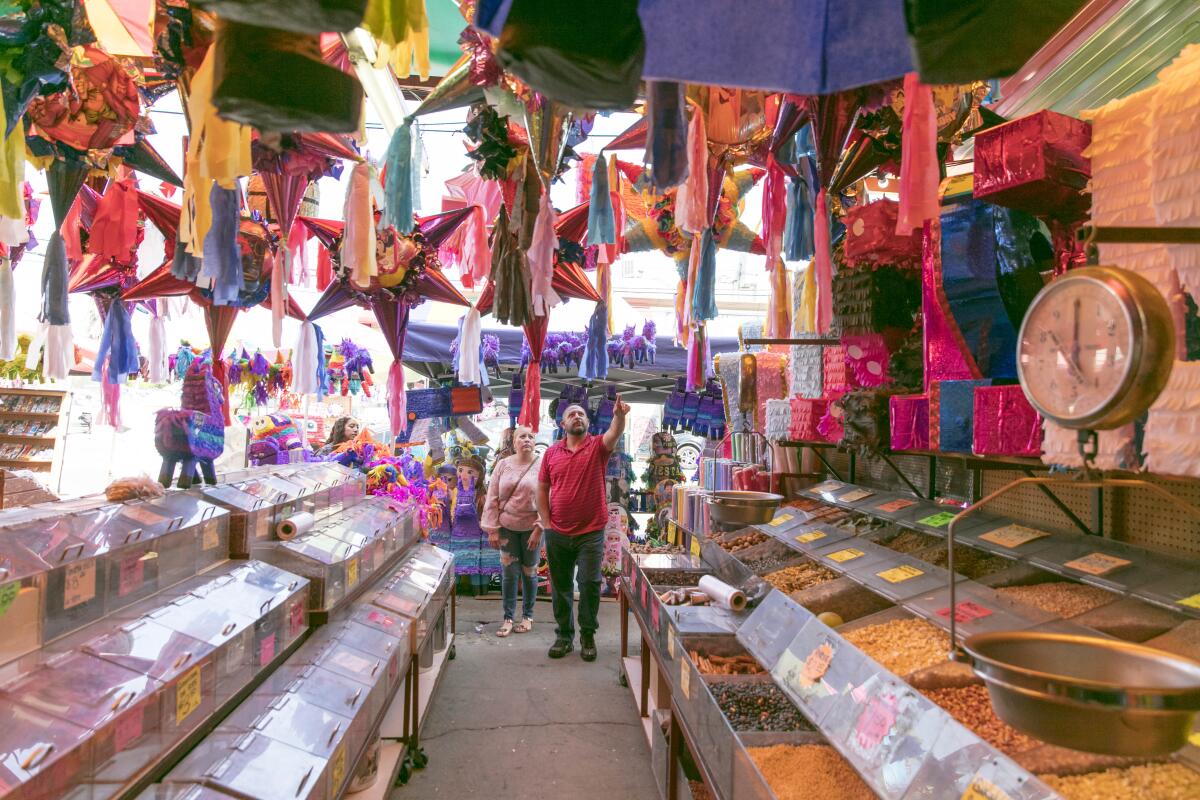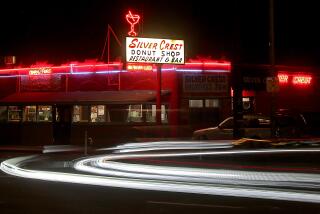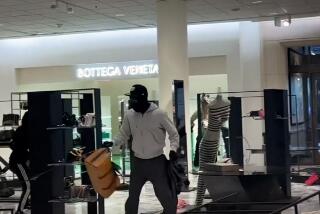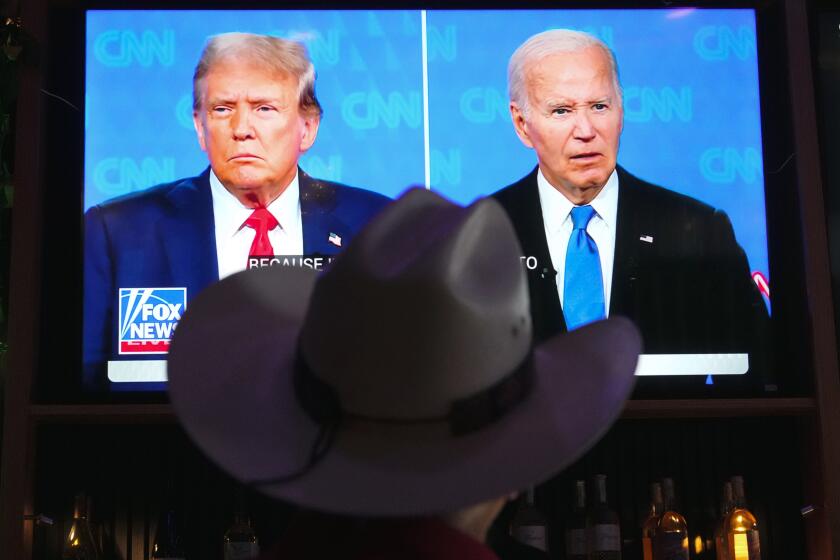Shrinking piñatas and revenues: Party supply stores show how life goes on amid a pandemic

The first time I saw a coronavirus piñata, two thoughts came to mind.
The first was bemused curiosity. They were in almost every party supply store I went to, and somehow every piñata’s designer had agreed: The coronavirus, if corporeal, would be a menacing, greenish orb with bloodshot eyes, bristling with a varying number of sucker-like protuberances.
The second was dismay. This was in early March, when most of the country hadn’t yet awakened to the pandemic’s danger, and these goofy piñatas seemed to make light of something that we all needed to take much more seriously.
But I’ve come to appreciate it as part of the rasquache magic of L.A.’s party supply industry. There’s something comforting about how this city’s piñata makers can transform any catastrophe into a comical object that we can string up, beat the hell out of and feast on its candy innards.
I’ve been talking to sellers of party supplies these last few months because they are uniquely affected by the reshuffled social rules around human interaction this pandemic has forced upon us. A single case at a gathering doesn’t just affect one person, family or social circle — it could create an outbreak that costs lives hundreds of miles away. And families are struggling to give up routines based on being together, lulled by a false sense of security among relatives, as my colleague Alejandra Reyes-Velarde wrote recently.
Party supply stores are caught in the middle as society veers between paranoiac caution and wishful ignorance. When fears about the virus grow intense, business slows. After lockdowns were lifted and cooped-up families threw caution to the wind, some stores saw record-breaking sales. As society adjusted to smaller gatherings, piñatas, cakes and revenues shrank too.
Steve Tellez, 45, of Pico Rivera has run Piñata Fiesta Party Supply and Rentals for about 12 years, his second career after working as an estimator at a body shop. He took over a retail party supply location and converted it to a prospering business focused on party rentals — though the pandemic has changed all of that.
“Every year has always been better than the next. And this hit took the floor right out from under us,” Tellez said.
He used to do up to 13 events a week, but these days he’s lucky to get one, which nets him just enough to pay for the warehouse where he stores equipment. He used to hire up to 13 people to help with large events, but now he works by himself, driving the tables, chairs and tents to the location and unloading them onto the curb.
He keeps face masks and hand sanitizer close, and asks his customers to keep their distance. He has a 4-year-old son, and his father was hospitalized with COVID-19 a few months ago and is still recovering with an oxygen machine at home.
The collapse of much of his business took a mental toll on him and he battled depression early on in the pandemic. But it’s also prompted a reordering of his priorities. If things stay bad for much longer, he won’t hesitate to give up the business.
“I’m 45 now, man. I don’t play games,” Tellez said. “I just know that without your health, no material things mean anything. We’re all going to die at some point. It’s how we live our life before that happens.”
At Navarro’s Party Supply in downtown Los Angeles, foot traffic blew up at first because people were panic buying, said Jocelyn Navarro, whose family has run the store for about 25 years. They were able to stay open because they sell produce and other groceries, and did a roaring business in masks and protective equipment.
Then things slowed down for about a month, when most cities in the region were ordered to lock down.
And then? Things just went back to normal, Navarro said. People started buying normal amounts of candy rather than enormous sacks and started ordering smaller piñatas. It’s as if people are looking for an excuse to get together, Navarro said.
“We’re grateful that people are still having parties and ordering piñatas,” Navarro said. “It’s like the show must go on.”
::
In pretty much every neighborhood I’ve been to in Los Angeles, rich or poor, gentrifying or blighted, there is always a party supply store.
A big reason for this is because Latinos are everywhere in Los Angeles, and big families need chairs, tables and tents. Kids need candy, piñatas and party favors.
But I also take some inspiration from their ubiquity. No matter who you are, no matter what income level or ZIP Code, everyone needs to celebrate something. Everyone wants their kid’s third birthday party to be mind-blowing; for their daughter’s graduation party to pop on Instagram; for their mother and father to have some place to sit and hold court at the quinceañera.
At Raquel’s Candy N’ Confections, balloon sales are up temporarily, but Christopher Luna, 33, is worried about the future. Weddings, conventions and corporate events — huge, consistent sources of revenue for the party industry — have almost completely disappeared.
After a career in finance, Luna and his brothers took over his family’s party supply store in downtown Los Angeles in 2012. He’s helped the store implement modern systems and stay on top of the rapidly evolving trends of the party industry. But he’s been frustrated by how hard it’s been to figure out the correct way to operate during the pandemic restrictions.
“You just don’t know who to listen to or what channel to turn to these days. And that’s what’s very surprising and depressing, that what’s OK and what’s not is not clear,” Luna said. “At the end of the day you just have to use your common sense. I just feel like it shouldn’t be political. It just doesn’t help.”
Parties have become controversial in the same, deeply unhelpful fashion that face masks and vaccines have. Our chaotic political discourse has somehow generated the absurd perception that taking the virus seriously is for Democrats, and ignoring the risks in favor of exercising freedoms is for Republicans. I imagine someone, somewhere will read this column as a blanket endorsement of parties and condemn me too.
These are bizarre times in which everyone can potentially see anyone else as a threat to their safety. Every conversation seems to be a matter of life and death. But it’s dangerous and illogical to treat pandemic safety issues like statements of moral and political values when they are really matters of science.
I actually took some hope from the knowledge that parties are happening and that some party supply stores are surviving. Shrinking piñatas, drive-by weddings and trying to safely gather with our loved ones are signs that we’re attempting to embrace a new normal.
More to Read
Sign up for Essential California
The most important California stories and recommendations in your inbox every morning.
You may occasionally receive promotional content from the Los Angeles Times.











